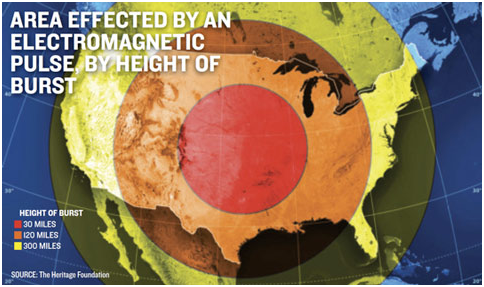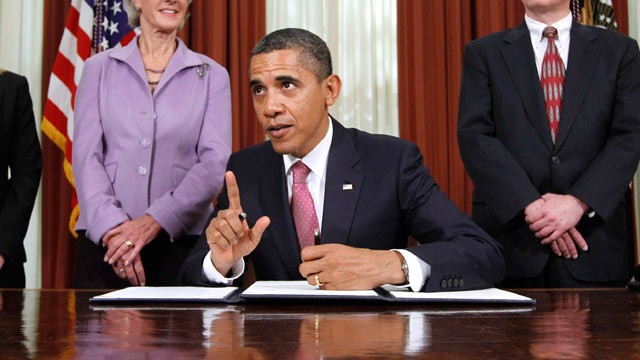The Iranian Nuclear Threat in the Gulf of Mexico
On the November 1, 2015 Lisa Benson Show we asked ex- CIA director, Ambassador R. James Woolsey how easy was it for Iran to launch an Electronic Magnetic Pulse (EMP) Attack on the US? He responded with the astounding revelation that the entire Gulf Coast of the U.S. had no X-band radar to detect a possible launch of a precision guiding missile with a nuclear warhead. Moreover, given Iranian threats to send naval vessels to the Gulf of Mexico, there would also be the threat of a cruise missile with a nuclear warhead that the U.S. Northern Defense Commander said in Congressional testimony was challenged to defend. Just refer to the stunning surprise of Russian vessels launching cruise missiles from the Caspian Sea that hit targets in Syria.
If Iranian nuclear weapons could be exploded at any altitude ranging from 30 to 300 miles, the EMP effect could take out the unprotected national electrical grid and 16 of the important infrastructures critical for running a modern technical economy. He suggested three means by which Iran could do this. One option was launching a weather balloon with a nuclear bomb in a gondola capable of exceeding the 30 mile altitude. The second was through the launch of a nuclear device in a satellite from a southerly direction that both North Korea and Iran are currently capable of doing. The third means is through a ship borne launch of a Scud missile with a nuclear warhead from a container vessel using the Russian K-Club system that our colleague Ilana Freedman has written about.
The question arises is does Iran, despite the U.S. acceptance of the JCPOA, allegedly have that capability, already. An August 2015 Washington Times article co-authored by Ambassador Woolsey and Dr. Peter Pry presented the view that Iran may already have several crude nuclear devices. Our colleagues Shoshana Bryen at the Jewish Policy Center and Ilana Freedman have also suggested that Iran could have evaded UN watchdog IAEA inspections by co-developing nuclear devices with North Korea.
 Ambassador Woolsey in response to this question said that a nuclear detonation over the central US heartland would be a “hideous prospect.” He said it would put the US back into the pre electrical agrarian era of the 1880s “with plowshares and seeds.” It could possibly resulting in millions of deaths from destruction of the electrical grid and disabling of our food production, distribution and health care delivery infrastructure systems. Listen to Ambassador Woolsey’s responses to these questions on the November 1st, 2015, Lisa Benson Radio Show beginning at the 30 minute mark.
Ambassador Woolsey in response to this question said that a nuclear detonation over the central US heartland would be a “hideous prospect.” He said it would put the US back into the pre electrical agrarian era of the 1880s “with plowshares and seeds.” It could possibly resulting in millions of deaths from destruction of the electrical grid and disabling of our food production, distribution and health care delivery infrastructure systems. Listen to Ambassador Woolsey’s responses to these questions on the November 1st, 2015, Lisa Benson Radio Show beginning at the 30 minute mark.
Ambassador Hank Cooper, a recognized expert in both EMP, and Missile Defense . He is the Former Director of the Strategic Defense Initiative program . Cooper confirmed the absence of radar and anti-missile defenses on the vulnerable Gulf of Mexico coast in an email exchange with Lisa Benson, host of the National Security Radio Show. He wrote:
Aegis BMD ships that are usually operating near the East Coast are inherently capable of defending against off-shore launched ballistic (and cruise) missiles—if the crews train to do so. And if we had TPY-2 radar in Maine or somewhere in the Northeast, they also could defend against Iranian ICBMs—again if the crews were trained to do so.
Where we are absolutely naked is from launches from vessels in the Gulf of Mexico. That could be fixed by deploying Aegis Ashore sites (like we are doing in Romania—operational this year–and Poland—operational in 2018) at bases around the Gulf. I’d begin at Tyndall AFB near Panama City, the home for First Air Force, which is already responsible for the air defense of the entire continental USA and support for our TMD systems.
The difficulty of defending the Gulf Coast against a cruise missile threat followed from a 2013 missile defense exercise. A Global Security Newswire March 2014 report, “Could the U.S. Face a Cruise Missile Threat from the Gulf of Mexico?” noted US Senate Armed Services testimony of Gen. Charles Jacoby of the Northern Command:
A 2013 military exercise pitted systems such as Patriot interceptors, Aegis warships and combat aircraft against potential cruise-missile or short-range ballistic missiles fired from the Gulf. But the drill highlighted a particular vulnerability to cruise missiles lobbed from that region, U.S. Northern Command head Gen. Charles Jacoby indicated in congressional testimony.
He said the Pentagon has “some significant challenges” in countering these missiles, but is exploring “some opportunities to use existing systems more effectively to do that. Many detailed results of the Oct. 11th drill conducted near Key West, Fla., remain classified, Jacoby said.
“The cruise-missile threat portion of that we are working on very hard,” the general added at the March 13, 2014 Senate Armed Service Committee hearing, in response to a question from Senator Ted Cruz (R-Texas).
The Global Security Newswire report underlined the difficulties of combating the cruise missile threat from Russia and Iran noting:
Cruise missiles can be particularly challenging to defend against, as they can be more difficult than aircraft to detect on radar and are sometimes tricky to shoot down, according to military experts.
A 2013 U.S. military intelligence report forecasted that cruise missiles would spread into more hands over the coming decade. The document also hints at the ability to evade defenses designed against ballistic missiles.
“Cruise missiles can fly at low altitudes to stay below enemy radar and, in some cases, hide behind terrain features. Newer missiles are incorporating stealth features to make them even less visible to radars and infrared detectors,” says the 2013 assessment by the National Air and Space Intelligence Center.
Lisa Benson during the November 1st Radio Show asked Woolsey if states should sue President Obama and U.S. companies doing business with Iran under existing sanctions laws authorized by the Federal 2010 Comprehensive Iran Sanctions Law. Woolsey said that if sanctions are illegally lifted by the President on Compliance Day, December 15, 2015, members of the plaintiffs bar might be “licking their chops “at the prospects of suing U.S. companies. We have written extensively about the ability of States with enabling sanctions laws bringing such a cause of action in the Federal Courts based on the professional assessments of noted Constitutional litigator, David B. Rivkin, Jr. of the Washington Law Firm of Baker Hostetler. See: Can States Prevent Release of Iran Sanctions Through Federal Litigation?
We launched a twitter campaign directed at the 27 Attorneys General of the Republican Attorneys General Association headed by Florida Attorney General Pam Bondi. Ms. Bondi could file such an action with the Attorneys General of Alabama, Mississippi and Texas against the President. It could be filed in the U.S. District Court for the Northern District of Florida in Pensacola, Florida presided over by Senior U.S. District Judge Roger Vinson.
The Dallas Chapter of the National Security Task Force of America (NSTFA) undertook a twitter campaign in October 2015 following the October 18th JCOPA Acceptance Date signing by President Obama. Pam Brown and the Dallas Chapter NSTFA team tweeted information on the ability to sue the President Obama to Texas Governor Abbott, Attorney General Paxton and 125 members of the Texas Legislature. She posted on the NSTFA Facebook this weekend of the continuing effort to contact Gov. Abbott at a meeting of the Texas Republican Women’s Conference in Lubbock:
Elena Blake, one of the team members, is in Lubbock at the Texas Republican Women Conference and Governor Abbott, our Texas governor, is in attendance. We produced a document that she hand carried with plans to present to Governor Abbott or his scheduler, whom she had just met at a meeting in Dallas on Wednesday. This is an example of jumping on opportunity that presents itself. The background story to our Twitter surge is that Governor Abbott and fourteen other governors signed a letter to President Obama [on September 8, 2015] about their opposition to the Iran Deal: “we intend to ensure that the various state-level sanctions that are now in effect remain in effect. These state-level sanctions are critically important and must be maintained. “. The other governors who signed this letter are from the states of Oklahoma, S. Carolina, S. Dakota, Utah, Wisconsin, Arizona, Arkansas, Florida, Indiana, Louisiana, Mississippi, New Jersey, North Dakota and Ohio. The letter that Elena Blake took to Lubbock for Governor Abbott urges him to rally six other governors to sue Obama. (NSTFA has determined we only need six or seven to sue.)
An appeal to Gov. Abbott could be the spark to enlist Attorneys Generals in Texas, Louisiana, Alabama and Florida to file an action in the Northern District US Court in Florida to halt lifting of sanctions by Obama. There is still time remaining to file such an action. The prod to do so are the revelations of Ambassadors Woolsey and Cooper revealing how unprotected these Gulf Coast States and indeed all of America is against an EMP attack by a nuclear armed Iran.
EDITORS NOTE: This column originally appeared in the New English Review.


